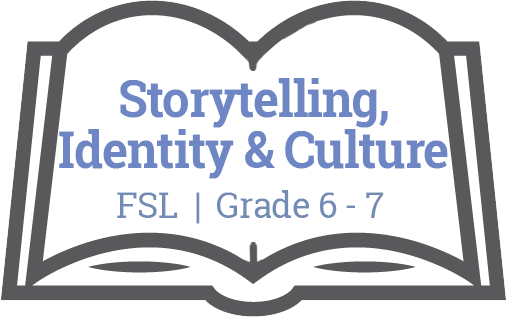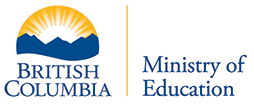
Unit Plan:
Storytelling, Cultural Identity and First Nations Culture
FSL / Grade 6-7

Big Ideas
Stories communicate ideas in a meaningful way.
Concepts:
- Culture
- Identity
- Communication
Essential Questions
Students will keep considering…
- Why do we tell stories?
- How does the way we tell a story reflect our cultural identity?
Evaluative Criteria
- Students will be evaluated by teacher using a rubric*
- Students will be evaluated by their peers using a rubric*
- Rubrics can be teacher generated, or generated together with students or can be a rubric that you use already for oral presentations.
- Please see Learning plan for more details.
- Teacher developed rubric for performance task including oral and cultural components.
- Rubric: Create a rubric which evaluates both French oral language skills and the cultural message in the story. Reflective process should also be used.
Monitoring Progress
Teacher will monitor progress:
Teachers can monitor progress through ongoing formative assessment including but not limited to:
N/A
Resources
WEBSITES
TEXTS
- La Danse d’Anisha. (Les Echos de l’île de la Tortue)
- C’est le temps de céléber ( Les Echos de l’île de la Tortue)
- “La famille, c’est special “ Echos 2 literacy book.
Reflection
How will teachers and their students reflect on and evaluate the completed project?
Teacher Reflection
- What aspects of the unit went well?
- What did students struggle with?
- What did you struggle with?
- What would you add/revise the next time you taught this unit?
- Were there any unintended outcomes?
- Were students engaged?
Downloads
Stage 2 – Evidence
Authentic Performance Tasks
AUTHENTIC PERFORMANCE TASK: Assessing for Understanding
Students will be able to demonstrate their understanding by:
GRASPS
What is a GRASPS task?
Other Evidence
OTHER EVIDENCE: Assessing for Knowledge and Skills
Students will show they have acquired Stage 1 knowledge and skills by:
Formative
- Students will participate orally in group discussions, warm up activities and games.
- Students will read out loud the French text and approximate French pronunciation.
- Students will share out loud ideas about cultural identity and storytelling.
- Students will reflect on their “story memories” and the cultural element of their story. (* See Learning Plan)

The following resources are made available through the British Columbia Ministry of Education. For more information, please visit BC’s New Curriculum.
Big Ideas
The Big Ideas consist of generalizations and principles and the key concepts important in an area of learning. The Big Ideas represent what students will understand at the completion of the curriculum for their grade. They are intended to endure beyond a single grade and contribute to future understanding.
Core Competencies
 Communications Competency
Communications Competency
The set of abilities that students use to impart and exchange information, experiences and ideas, to explore the world around them, and to understand and effectively engage in the use of digital media
 Thinking Competency
Thinking Competency
The knowledge, skills and processes we associate with intellectual development
 Social Competency
Social Competency
The set of abilities that relate to students’ identity in the world, both as individuals and as members of their community and society
Curricular Competencies & Content
Curricular Competencies are the skills, strategies, and processes that students develop over time. They reflect the “Do” in the Know-Do-Understand model of curriculum. The Curricular Competencies are built on the thinking, communicating, and personal and social competencies relevant to disciplines that make up an area of learning.
Additional Resources
First People's Principles of Learning
To read more about First People’s Principles of Learning, please click here.
For classroom resources, please visit the First Nations Education Steering Committee.
